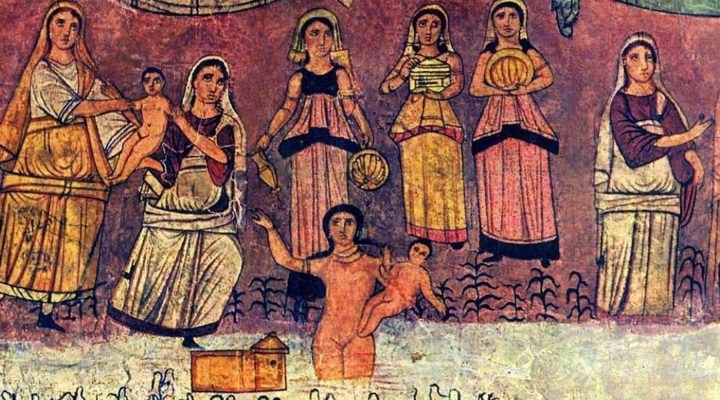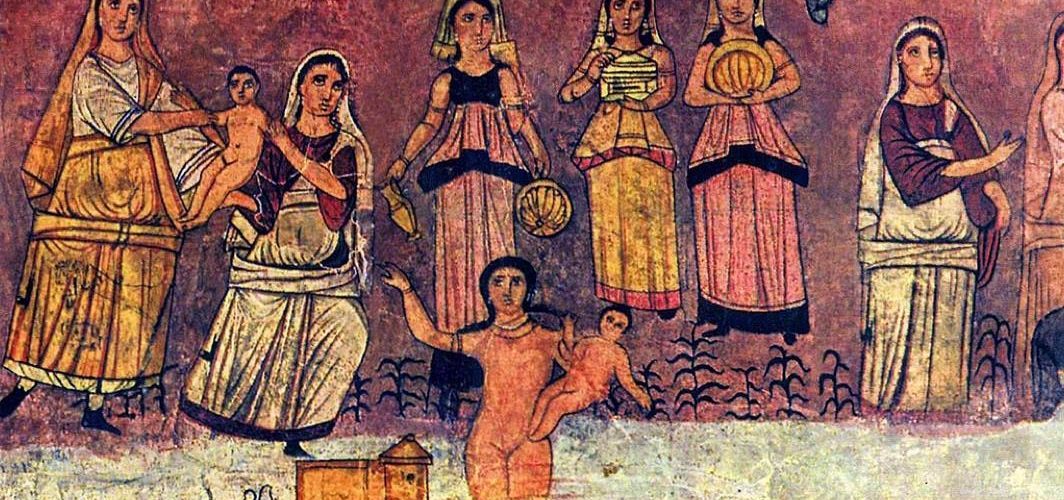The Bible is full of women heroes, exemplars of courage. We do not give them attention, and very few end up in the stained-glass windows. Two of these heroes are Shiphrah and Puah, Hebrew midwives in Egypt during the Hebrews’ time of slavery.
Remarkably, the name Shiprah has been found on a list of Egyptian slaves. They also were troublesome women, making what John Lewis called “good trouble.”
The Moses story of God’s deliverance of the Hebrew people from slavery begins with the first chapter of Exodus and with these two women. Why did the writer of Exodus remember them to us in the story? Because without them Moses may never have made it into the world. They were not just remembered, they were named: Shiphrah and Puah.
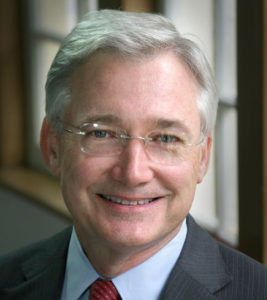
Stephen Shoemaker
The Pharoah, paranoid over the numbers and strength of the Hebrew slaves there and afraid of a slave uprising, ordered the Hebrew midwives to strangle all Hebrew baby boys at birth. Power breeds paranoia.
In 1964, Richard Hofstadter wrote an influential essay titled “The Paranoid Style in American Politics.” Do you want to win an election? Play to people’s fear and paranoia, spread conspiracy theories. Do you want to be sure to win? Sprinkle in a little religion.
Today, white people’s paranoia is being stoked with the racist idea called “white replacement theory.” White people are losing power, it claims, as America turns more brown and Black. So we must stop them from coming into the country and make it as difficult as possible to vote. America is on target to be a minority/majority nation by 2042. Beware!
The Jim Crow laws enacted soon after Reconstruction (which disempowered Black citizens and lasted until the 1960s), the 1898 Wilmington Race Riot in North Carolina (provoked by the number of Black citizens elected to public office and which ran most of the Black population out of the city), the swath of new voting restriction laws sweeping the U.S. today, all have been fueled by one version or another of white replacement theory.
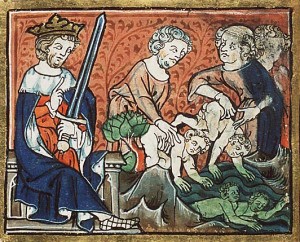
Pharaoh decrees the drowning of every new male offspring among the Israelites by Michiel van der Borch, 1332
Scripture says the harder the Egyptian overlords oppressed the Hebrew slaves, the faster they multiplied. Baby-making as a seditious act. A king cannot control everything, but Pharoah tried. The first death decree was to strangle all baby boys at birth.
Enter Shiphrah and Puah and these thrilling words: “But the midwives feared God and did not as the king of Egypt commanded.”
Women have been doing such things throughout history, breaking laws, rules and customs for the sake of a higher law and deeper morality. This is how God works, surprising the high and mighty.
Paul wrote: “But God chose what is foolish in the world to shame the wise; God chose what is weak in the world to shame the strong; God chose what is low and despised in the world, things that are not, to reduce to nothing the things that are.”
Shiphrah and Puah committed civil disobedience because God’s law was higher than human laws. They “feared God,” which means not abject fear, but reverence, loyalty and obedience to a higher law.
The acclaimed novelist Zora Neale Hurston writes of what was at stake in Egypt: “The birthing beds of Hebrews were matters of state.” The Hebrew womb had fallen under the heel of Pharoah.
“The birthing beds of Hebrews were matters of state.”
We shudder at the words and over the actions of those today in our nation who want to use the power of state to control women’s wombs. Recently, 650 women’s marches were planned on the same day across the nation to protest the Texas abortion law and the Supreme Court’s refusal to hear it. Troublesome women.
When brought before Pharoah to explain why so many Hebrew baby boys were surviving, Shiphrah and Puah said: “These Hebrew women are so strong and vigorous, why, they give birth so fast that by the time we are there the babies are already there!”
We smile at their words and ingenious defense. The fear of the Lord in the hearts of the nurse-midwives is greater than all the Pharaohs of the world. We praise Shiphrah and Puah and all the women through history who have followed in their school of courage.
Sen. Mitch McConnell, Republican majority leader at that time, once ruled Sen. Elizabeth Warren out of order as she tried to bring in the testimony of Coretta Scott King. He said of her, “She was warned, she was given an explanation, nevertheless she persisted,” words that launched a million T-shirts.
“The first preacher I heard preach of Shiphrah and Puah was Nancy Hastings Sehested.”
The first preacher I heard preach of Shiphrah and Puah was Nancy Hastings Sehested. In a later sermon to the Alliance of Baptists, she challenged them to become a “Shiphrah and Puah Society.” Want to join?
Enraged by the disobedience of the midwives, Pharoah issued a second death decree: All Hebrew baby boys were to be thrown into the Nile, thus turning their river of life into a death canal.
Then came three more women heroes: Moses’ mother, who hid him in some bullrushes of the Nile, Moses’s older sister who watched over him and, believe it or not, Pharoah’s own daughter, who took him in.
The Pharoah wanted all the male babies killed, but it seems it was the women who were causing most of the good trouble.
What about other troublesome women in the Bible and throughout history? Where would you start?
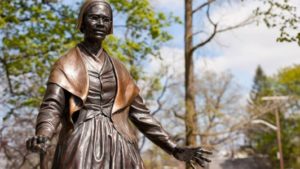
Sojourner Truth statue
Sojourner Truth, the freed slave who became a champion for the abolition of slaves and the emancipation of women. Jesus appeared to her in a vision and called her to be a preacher and emancipator. Once when she was giving a sermon in a public place, the heckling began. One man shouted, “Who do you think you are? A woman cannot preach!” She replied, “And where do you think Jesus came from? From God and a woman! Man had nothing to do with it!”
Susan B. Anthony and the suffragettes who risked everything for the right of women to vote. Anthony’s tombstone in Rochester, N.Y. gets covered every election day in “I voted!” stickers. On election day in 2016, when Hillary Clinton was on the ballot, more than 10,000 women made the trip to place their stickers on the stone.
Frances Perkins who, on March 21, 1911, was visiting a friend near Washington Square in New York City. They witnessed in horror the Triangle Shirtwaist Factory fire. Young workers, mostly women, were leaping from windows to their deaths to escape the fire. The large factory had no fire escapes. God called her out of the burning building as clearly as God called Moses out of the burning bush. She became a champion of worker’s rights. She joined Franklin Roosevelt’s Cabinet as Labor Secretary, the first woman to serve in a President’s Cabinet, and served there 12 years, the longest tenure of any cabinet member. While in that position she was key to the development of Social Security, unemployment insurance and the minimum wage. Today the Department of Labor is located in the Frances Perkins Building.
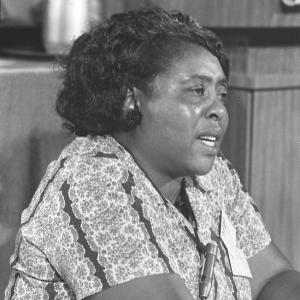
Fannie Lou Hamer
Fanny Lou Hamer, one of the unsung heroes of the Civil Rights Movement. Early in her participation in civil rights action she was jailed and beaten so savagely she never fully recovered from some of the injures. She chaired the Mississippi Freedom Party delegation of the 1964 Democratic Convention, challenging the all-white delegation from Mississippi. In the darkest moments of those days, she taught and led civil rights crowds to sing “This little light of mine, I’m gonna let it shine.”
Dorothy Day was perhaps the greatest Catholic social reformer of her day. Early in her young adult life, she was an atheist and activist for others. She became a Christian and joined the Catholic Church at the birth of daughter Tamar. She served the poor of New York City and beyond in her Friendship Houses. The paper she began, The Catholic Worker, was read by thousands for years. Near the end of her life, she was asked about her life. She paused, then said this: “I just sat there and thought of our Lord, and his visit to us all those centuries ago, and I said to myself that my great luck was to have him on my mind for so long a time in my life.” Our great luck too.
Who would you add? I think of Malala, the young teenager on the way to school on a school bus who was shot in the head by a Taliban terrorist, who survived and has become a world leader in education for girls. And Greta Thunberg, teenage climate change activist who, with her autistic laser focus has stared down governments.
I could go on and on. Time fails me. You could too. In my 50 years of ministry, I have seen the crucial role of women in the life of the church. Their leadership and spirit and work have kept the church alive and vital.
Some male persons have decried what they have called the “feminization of the church” and the “feminization of society,” decrying the number of women taking leadership in church and society. I think the guys with white replacement theory anxiety have male replacement anxiety too.
So let us praise Shiphrah and Puah and all their descendants who by their courage and conviction have made and are making our world closer to what God means for us to be.
Stephen Shoemaker serves as pastor of Grace Baptist Church in Statesville, N.C. He served previously as pastor of Myers Park Baptist in Charlotte, N.C.; Broadway Baptist in Fort Worth, Texas, and Crescent Hill Baptist in Louisville, Ky.
Related articles:
The untold story of Black women leaders in the Civil Rights Movement | Opinion by Marvin McMickle
White evangelical leaders who repress women are revered as saints, author says
I knew the truth about women in the Bible, and I stayed silent | Opinion by Beth Allison Barr
Where are the women in American evangelicalism? | Opinion by Melody Maxwell

